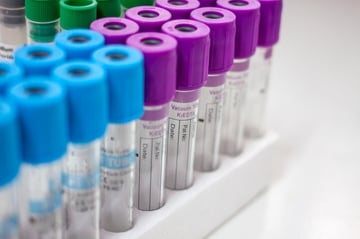
Bioanalytical Services
Quantitative Assays for Peptides using LC-MS
Quantitative high-throughput analysis of peptide therapeutics and biomarkers to regulated bioanalytical standards
Peptides are an important class of therapeutics for a wide range of indications. They are highly selective and targeted when compared to chemically synthesized drug substances, yielding low toxicity and lessening the probability of side effects. Traditionally, ligand binding assays (LBAs) have been the default method of analysis for Pharmacokinetic and Pharmacodynamic applications. However, immunoassay approaches for peptide therapeutics and biomarkers are challenged by limited specificity of antibodies against these targets. LC-MS approaches can overcome these specificity challenges but have lacked the required sensitivity for quantification of low-abundance peptide markers or potent peptide therapeutics. Further, some peptides are resistant to gas-phase collision induced dissociation, limiting the application of the gold-standard analyzer, the triple quadrupole mass spectrometer and associated MS/MS approaches.
High resolution mass spectrometry and nano-scale liquid chromatography
High resolution mass spectrometry (HRMS) – with or without fragmentation – achieves a level of selectivity above that afforded by conventional low-resolution MS approaches, independent of the chromatographic flow rate required. This approach overcomes the challenges with triple quadrupole detection for peptides resistant to fragmentation.
Nano-scale LC separation and ionization delivers the ultimate sensitivity where needed, and multidimensional chromatography with separation by molecule size further enables the robustness comparable to conventional flow chromatography. Multidimensional chromatography, with size-exclusion chromatography (SEC) upstream of reversed- phase separation, can alleviate the robustness issues associated with intact circulating peptide quantification when nano-ESI is required for sensitivity. It can be easily coupled to affinity enrichment protocols, or independent of such clean-up as the bioanalytical challenge dictates.
In particular, the inclusion of SEC alleviates LC pressure issues such that antibody-based purification is not needed to enable use of nano-LC. For example, methodology was developed with solid-phase extraction (SPE) prior to SEC, nano-LC, and HRMS detection for quantification of intact atrial natriuretic peptide (ANP) in human plasma down to 2 pg/ mL. This allows highly sensitive, robust, high-throughput measurement without risk of capture bias, lengthy incubation times, and affords ability to multiplex detection of isoforms, truncations, or other natriuretic peptides.
Quantitative measurement experience with peptides
Our team provides solutions to the challenges encountered when quantitating peptides. We utilize expertise from multiple scientific disciplines to develop sensitive and robust methods. We have extensive experience with a variety of peptides, including but not limited to:
- Cytokines
- Hepcidin
- Incretins
- Insulins
- Natriuretic peptides
- Therapeutic peptides fused to proteins
- Therapeutic peptides to treat multiple sclerosis, diabetes, obesity, oncology, NASH, and gastrointestinal disfunction
LC-MS/MS Bioanalytical services are GLP and GCP compliant in support of FDA, OECD, MHLW, ICH standards
Our approach
We offer a number of bioanalytical services to support your trial, including tailored liquid chromatography-mass spectrometry (LC-MS) services, a key methodology in today’s pharmacokinetic (PK) testing. Our highly experienced staff utilizes leading- edge technology including AB SCIEX™ triple quadrupole mass spectrometers, Thermo Scientific HRMS, and state-of-the-art extraction techniques.
We are one of the few bioanalytical laboratories successfully employing immunoprecipitation techniques, HRMS, and multi-dimensional liquid chromatography for the quantitation of peptide and protein biotherapeutics and biomarkers. Our team has the experience and knowledge in development and validation of small and mid-size peptides to proteins, fusion proteins, monoclonal antibodies, and complex biologic modalities.
The development of these assays is followed by method validation and sample analysis consistent with global regulatory requirements and governed by SOPs.
Related Services

Bioanalytical Services
Learn more
Small and Large Molecule LC-MS
Learn more
Biotherapeutic Immunoassay Services
Learn more
Immunoassay and Immunogenicity
Learn more
Bioanalytical Immunoassay Services for Biosimilar Development
Learn more
Validated assays for small molecules and biomarkers
Learn more

